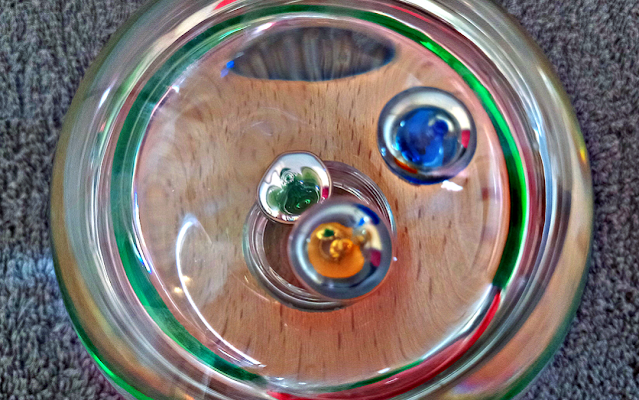I love having interesting and unusual things in my home. Recently I received the Kikkerland Bear Organizer which I thought was something a bit different and at the same time I also received something that I had never seen or heard of before, the Kikkerland Galileo Thermometer. I thought it was so unusual.
When it comes to thermometers we are spoiled for choice nowadays with everything from the tried and true mercury thermometers to cutting edge digital sensors. Italian astronomer and physicist Galileomade a number of significant discoveries, one of which was that temperature variations have an effect on how much a liquid expands and shrinks or its density. The Galileo thermometer, usually a glass tube or ball filled with liquid and glass baubles filled with liquid and each with a specific temperature medallion was developed in response to what he discovered.
The water inside the Galileo thermometer changes temperature along with the atmospheric temperature which causes the water to either expand or contract and alter its density. Some of the spheres will float when the water density changes, while others will sink.
The medallions are calibrated counterweights that are imprinted with a temperature reading. They are responsible for the spheres' rising and falling. The weight of sinking spheres is more than the temperature, whereas the weight of floating spheres is less than the temperature. Depending on how the spheres are responding several techniques are used to determine the temperature. One sphere has the correct temperature reading on its medallion if it floats roughly in the middle of the floating and sinking sphere groups. If there isn't a sphere floating in the middle of the top group of spheres and the bottom group of spheres the temperature can be calculated by averaging the readings from the lowest sphere in the top group and the highest sphere in the bottom group. When all the spheres float the temperature is below the lowest sphere. If all the spheres sink, the temperature is above 28°C or 84 degrees Fahrenheit.
It is easy to see why Galileo Thermometers are still so popular. They are not just beautiful to use as ornaments but the movement of the glass globes inside the water makes them fascinating to watch.
The Kikkerland Galileo Thermometer is a great conversation starter and I love it. I would say it is the size of a very large orange and sits beautifully in it's wood base. It is available to buy from Amazon for around £17.87 but prices do often change on there. This would make a great gift for someone who is hard to buy for. It certainly is something a little different.
Have you ever heard of a Galileo Thermometer?
I was sent the Kikkerland Galileo Thermometer free of charge in exchange for this blog post.


































